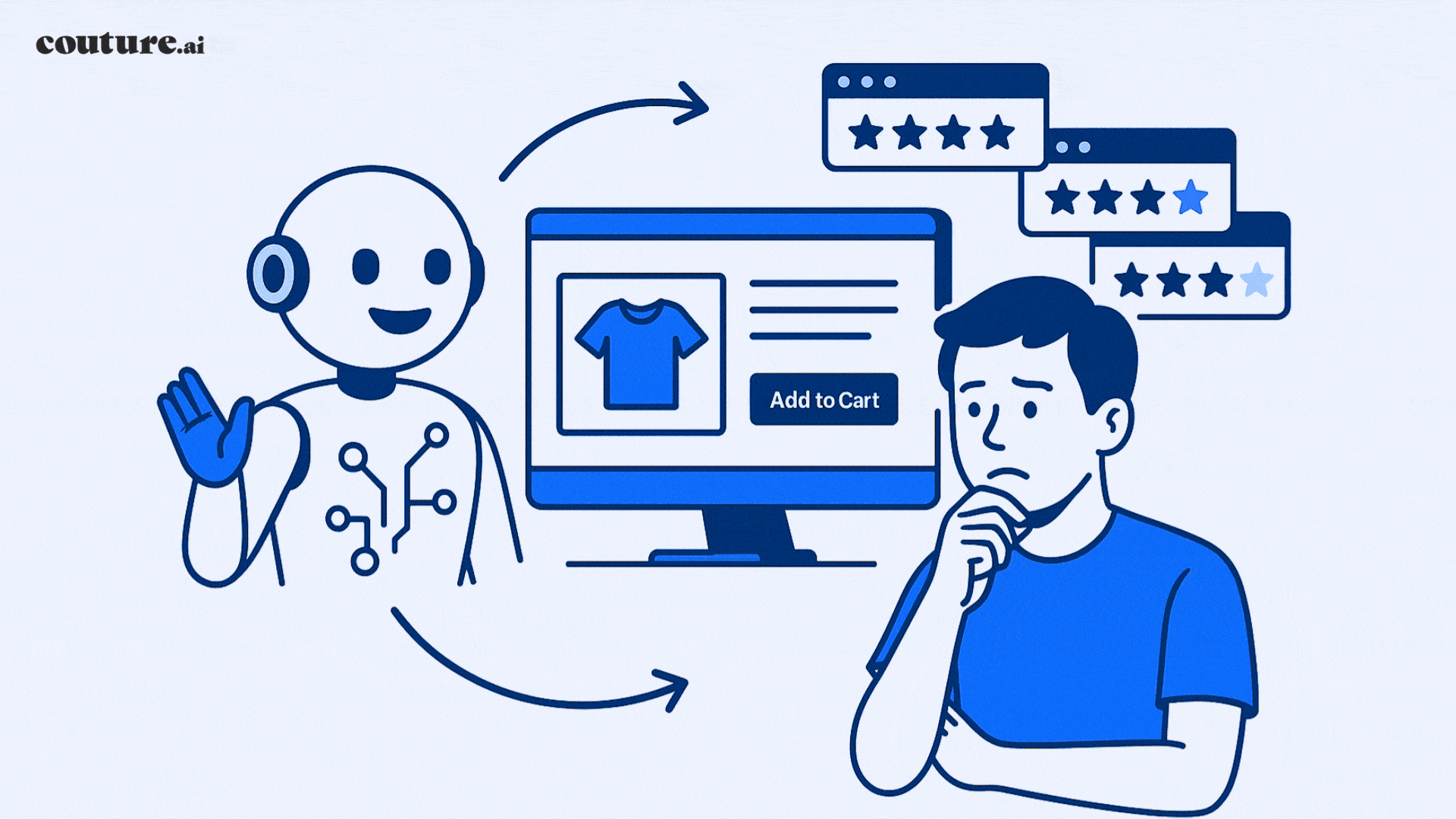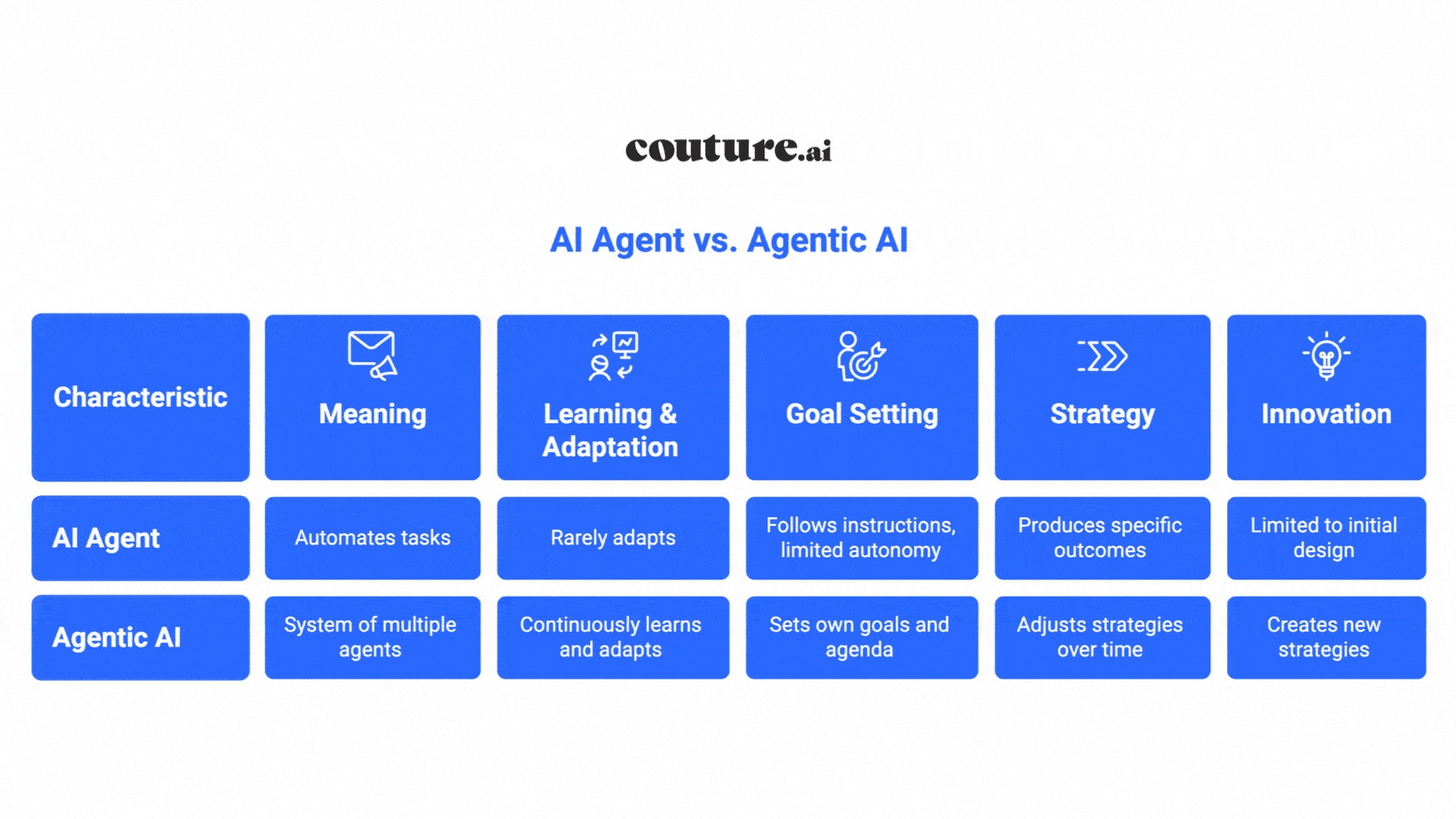Oct 29, 2025 | Couture AI Team
Here's what keeps e-commerce executives tight up all the time: customers visit your site, spend 20 minutes browsing, compare your products against three competitors, then leave without buying anything. The next day, they purchase from another brand - not because of price, but because they got tired of doing all the research and product comparison themselves.

According to Baymard Institute's recent report, the global cart abandonment rate remains over 70%, with nearly 48% of shoppers noting unexpected costs and 22% saying complex checkout as reasons for leaving mid-purchase.
This shows just how much friction still exists in the online buying journey. AI shopping agents are improving this broken shopping experience.
And consumers are ready for this change - According to Salesforce’s Connected Shoppers Report, 39% of all consumers - and over half of Gen Z - are already using AI for product discovery
These actually shop for shoppers by comparing specifications across platforms. They read through reviews. They make purchase decisions. And they complete transactions, all without anyone clicking a mouse.
Let’s take an example of someone who needs running shoes. They Google it. They open tabs for Nike, Adidas, Amazon, and so on. They compare prices, read reviews, check shipping times, then maybe - they buy something.
An AI shopping agent transforms this process.
The customer says, "Find me running shoes under $150 with good arch support for marathon training."
The agent searches multiple retailers simultaneously. Filters by specifications that matter (not just marketing fluff). Analyzes actual customer reviews for arch support mentions. Compares shipping options. Then presents three options with clear reasoning for each.
To simplify the checkout experience, read our latest blog on Conversational Checkout: How AI Shortens the Path From Chat to Purchase to discover how conversational AI eradicates friction points, reduces cart abandonment, and transforms lengthy checkout processes into seamless, natural interactions that increase conversion rates.
Many e-commerce companies believe they have AI because they installed a chatbot. That's not even the case.
A chatbot answers direct questions like: "What's your return policy?" or "Do you have this in blue?".
An AI shopping agent takes effort: It finds the blue shirt, confirms it's in stock, adds it to the cart, applies the best coupon code, and completes the checkout.
This shift from generative AI to agentic AI matters more than most retailers recognize.
Generative AI creates content, product descriptions, email responses, and social media posts.
Agentic AI makes decisions and acts on them. Reorders inventory when stock runs low. Adjusts prices based on competitor data. Completes customer purchases based on stated preferences.
The difference is Autonomy.
Tools like Amazon's Rufus help customers find information, and autonomous agents complete entire shopping journeys from start to finish without anyone supervising them.
A recent study noted that 83% of global retailers saw operational efficiency improvements with AI.
Built an AI assistant called Wally for their store employees. It helps with inventory management, finding products in back rooms, and answering operational questions using real-time data from every Walmart location.
This wave of AI adoption is industry-wide - 89% of retailers globally are either already using or actively piloting AI in their daily operations.
They have also launched a GenAI-powered shopping assistant for customers. If you're planning a birthday party, it creates a complete shopping list. Need to furnish a home office? It suggests everything from desks to desk lamps based on your budget and style preferences.
Released Buy For Me, which selects products matching specific customer needs. Instead of typing "wireless headphones noise canceling," someone can say "headphones for my commute on noisy trains" and get options filtered by what actually matters for that situation.
Implemented Agentforce to handle customer interactions through SMS. A customer sends photos of an outfit they like. The AI finds similar items in their size, coordinates pieces that work together, places the order, and handles size exchanges if needed. Just like a personal shopper, except available 24/7.
Couture.ai builds these kinds of custom solutions for e-commerce businesses. The technology works. The challenge is integrating it properly with existing systems and business processes. See how it works here.
AI agents automate tasks with predefined parameters and goals, designed to produce a specific outcome or a certain range of outcomes. Once trained, they don't typically continue to adapt with new data.
Agentic AI is a system of AI agents organized in a hierarchical structure. Unlike an AI agent, agentic AI continues to evolve with new data. It has autonomy to use new data to help set its agenda and long-term goals, adjusting strategies over time, and creating new strategies not part of the system's original design.
The main difference in Autonomy and Proactiveness: Agentic AI is assertive, capable of setting its own sub-goals and initiating actions to pursue a strategic objective, similar to a project manager. Conversely, a traditional AI Agent is usually more reactive, waiting for a specific trigger or input before executing its defined task, like an expert tool waiting to be called upon.
Ultimately, in terms of Complexity and Collaboration, Agentic AI handles vast, complex workflows by coordinating multiple AI Agents, tools, and systems to work together towards a shared outcome. An individual AI Agent, while capable of a sophisticated task, generally operates in a more isolated fashion, with its effectiveness limited to its programmed functionality.

The entire system works together. Autonomously. Without constant human oversight.
The move from browsing only shopping to agent-based shopping is on its way. The companies that adapt their strategies now will define how their industries operate.
According to a 2025 eMarketer survey, 75% of retailers believe AI agents will be essential for maintaining competitiveness within the next two years, and 81% trust these systems to act autonomously, provided they are equipped with proper guardrails.
Couture.ai helps build AI solutions tailored to your brand's requirements and existing systems. Book a free demo to see how this works for your brand.
Subscribe to get the latest updates and trends in AI, automation, and intelligent solutions — directly in your inbox.
Stay Informed: Insights and Trends from Couture AI
Reduce operational complexity, improve planning accuracy, and deliver smarter retail execution with Couture AI.